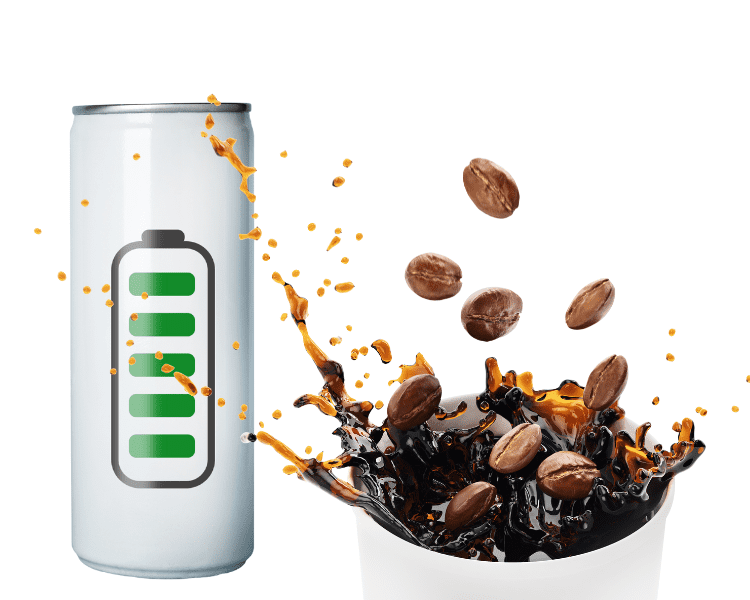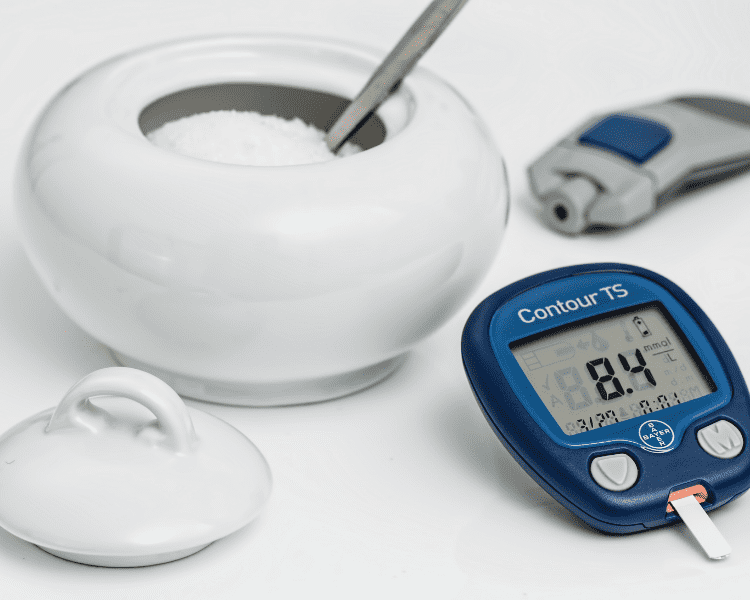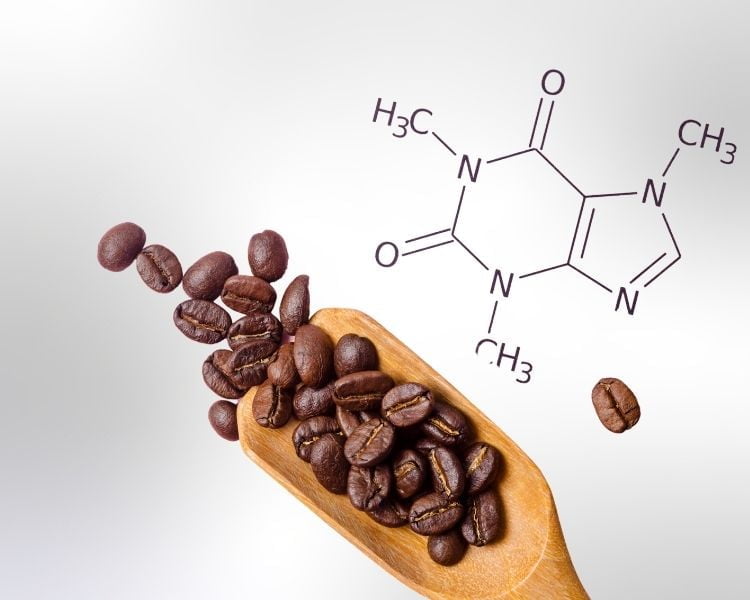All You Need to Know About Caffeine
Caffeine, a widely consumed stimulant, is found in various foods and beverages and mostly in drugs. It’s known for its ability to provide an energy boost and increase alertness but it can also have negative effects on the body if consumed in excess.
But what exactly is caffeine, and how does it affect your body? In this comprehensive guide, we’ll delve into the science behind caffeine, its sources, potential benefits, associated risks, and address common myths.

What is caffeine and what does it do to your body?
Caffeine primarily affects the brain and central nervous system, helping you stay alert and prevent the onset of tiredness. This psychoactive substance is legal and unregulated in nearly all parts of the world.
The chemical structure is similar to that of adenosine, a type of molecule that makes you feel tired. Thus, when consumed, caffeine competes with adenosine for the receptors in your brain, keeping you awake and alert.
Excessive consumption, however, can have detrimental effects on health, including anxiety, jitteriness, and even dependency. Related Post: How much caffeine is too much?
Adding caffeine to energy drinks and dietary supplements make it an ingredient that can be easily overused without the consumer realizing.
The FDA suggests a daily caffeine intake of no more than 400mg, equivalent to 2-3 cups of coffee.
Sources
Caffeine is naturally found in several plants, seeds, nuts, and fruits, with the most common and well-known sources being coffee beans, tea leaves, and cocoa nuts.
- Coffee Beans: Known as the world’s primary source, coffee beans are harvested from species of the Coffea plant. A single cup of coffee can contain anywhere from 95 to 200 milligrams of caffeine, depending on its preparation and type.
- Tea Leaves: Predominantly found in Camellia sinensis leaves used for black, green, and white teas. The caffeine content varies extensively, from about 20 to 60 milligrams per cup.
- Cocoa Beans: Used in the production of chocolate, cocoa beans contain a small amount of caffeine. A bar of dark chocolate can have as much as 70 milligrams of caffeine.
- Kola Nuts: Traditionally used in many African cultures for ceremonies, kola nuts are also used in the making of certain types of soda due to their caffeine content.
- Guarana Berries: Native to the Amazon basin, guarana berries are an excellent source of caffeine, with nearly twice the concentration found in coffee beans.
- Yerba Mate: This traditional South American drink made from the leaves of the Ilex paraguariensis plant boasts a caffeine content comparable to that of tea.
Remember, the exact caffeine content can vary depending on the plant, the part used, the method of preparation, and the specific product.
Caffeine dependency and withdrawal
Caffeine is a psychostimulant that can cause dependency in regular consumers. It means that your body gets used to the effects of caffeine and requires it to function normally.If you suddenly stop consuming caffeine, you may experience withdrawal symptoms such as headaches, irritability, fatigue, and difficulty concentrating.However, unlike other drugs, these symptoms are typically mild and short-lived. Moreover, individuals with pre-existing conditions like anxiety or panic disorders should consult with their health care providers before consuming caffeine daily.

Energy drinks and caffeine
Energy drinks are marketed as quick and convenient ways to boost energy levels. They often contain high amounts of caffeine along with other stimulants like guarana, taurine, and B vitamins.
While there is no evidence that occasional consumption of energy drinks can cause negative health effects in healthy individuals, excessive intake can be harmful.

Mixing alcohol with energy drinks can be dangerous as it may mask the effects of alcohol, leading to overconsumption and potential negative health outcomes.
Benefits
Caffeine offers a range of potential benefits, from increased alertness to improved cognitive function. We’ll examine the positive effects of caffeine consumption, backed by scientific research.
Increased Alertness and Energy Levels: Caffeine is renowned for its ability to mitigate fatigue and enhance wakefulness. This stimulating effect can boost energy levels, particularly during periods of prolonged activity or in individuals suffering from sleep deprivation.
Improved Physical Performance: Caffeine may enhance physical endurance and performance during exercise by mobilizing fatty acids from the fat tissues and making them available as fuel for your body.
Enhanced Cognitive Function: Some research suggests that caffeine might boost cognitive function, improve memory recall, and increase problem-solving abilities and reaction times.
Weight Loss: Caffeine stimulates thermogenesis – one way your body generates heat and energy from digesting food, which may help with weight loss or maintenance.
Lowered Risk of Type 2 Diabetes: Regular caffeine consumption has been linked to a reduced risk of developing type 2 diabetes, although this may depend on the individual and the amount of caffeine consumed.
Reduced Risk of Neurological Disorders: Several studies indicate that regular caffeine consumption could potentially lower the risk of developing neurological disorders like Parkinson’s and Alzheimer’s disease (*).
Lowered Risk of Stroke: Moderate consumption of caffeine may be associated with a reduced risk of stroke, particularly in women.
Antioxidant Properties: Caffeine is rich in antioxidants which can combat inflammation and neutralize harmful free radicals in the body.
Improved Mood: Caffeine may also boost the production of certain neurotransmitters like dopamine, thereby enhancing mood and overall brain function.
Benefits of Caffeine Consumption for Cancer
Some observational studies suggest that caffeine consumption could be linked to a reduced risk of developing certain types of cancer.
Reduced Risk of Skin Cancer: According to a study published in the Journal of the National Cancer Institute, there is an inverse relationship between caffeine intake and the risk of developing basal cell carcinoma, a common type of skin cancer.
Lowered Risk of Liver Cancer: A meta-analysis of observational studies found that for every 2 cups of coffee consumed daily, there’s a 43% reduced risk of liver cancer.
Decreased Risk of Colorectal Cancer: A recent study in the Journal of Clinical Oncology found that regular caffeine consumption might be associated with a lower risk of colorectal cancer recurrence and mortality.
Potential Protective Effect Against Breast Cancer: Some research indicates that caffeine may reduce the risk of developing breast cancer, especially in people who metabolize caffeine more efficiently.
While these findings are promising, it’s important to remember that these studies show an association, not causation. Further research is required to fully understand the relationship between caffeine intake and cancer risk. Moreover, caffeine should not be considered a substitute for proven preventive measures such as routine screenings, a balanced diet, and regular exercise.
Risks
While caffeine has its advantages, excessive consumption can lead to adverse effects. We’ll explore the potential risks associated with caffeine, including anxiety, insomnia, and heart palpitations.
- Anxiety: Caffeine can stimulate the body’s “fight or flight” response, and excessive consumption may lead to heightened feelings of anxiety, restlessness, and jitteriness.
- Insomnia: As a central nervous system stimulant, excessive caffeine can interfere with your sleep patterns, leading to insomnia or poor quality of sleep.
- Digestive Problems: High doses of caffeine can cause gastrointestinal upset by stimulating the release of gastric acid.
- High Blood Pressure: Temporarily raised blood pressure is a common side effect of caffeine, but the long-term effects are currently unclear.
- Rapid Heart Rate: The stimulant effects of caffeine can cause your heart to beat faster.
- Fatigue: While moderate amounts of caffeine can increase alertness, the effects are temporary. As the caffeine wears off, there can be a rebound effect, leading to feelings of fatigue or lethargy.
- Frequent Urination and Urgency: Caffeine may have a mild diuretic effect, which can lead to an increased need to urinate.
- Dependency: Regular consumption of caffeine can lead to physical dependence, resulting in withdrawal symptoms such as headaches, irritability, and low energy when caffeine consumption is reduced or stopped.
- Pregnancy Risks: High consumption of caffeine may be associated with an increased risk of pregnancy loss, low birth weight, and developmental delays.
- Drug Interactions: Caffeine can interact with certain medications, altering their effectiveness. It’s always wise to consult with a healthcare provider regarding potential interactions.
Last Words from the More Clinics
In conclusion, caffeine is a widely consumed stimulant with both benefits and risks. Understanding how caffeine affects your body, its various sources, potential uses, and debunking common myths can help you make informed choices about its consumption. As with many things in life, moderation is key when it comes to enjoying the perks of caffeine while minimizing its potential drawbacks.
Frequently Asked Questions
Caffeine can lead to dependence in some individuals, but it is not considered a true addiction. Withdrawal symptoms may occur with abrupt cessation.
The recommended safe daily caffeine intake varies but is generally considered to be around 400 milligrams for most adults.
Excessive caffeine intake may lead to heart palpitations and increased heart rate in some individuals. It’s essential to monitor your caffeine intake, especially if you have underlying heart conditions.
There is no scientific evidence to support the claim that caffeine consumption stunts a child’s growth.
Moderate caffeine consumption (up to 400 milligrams daily) is not typically associated with significant dehydration. However, it’s crucial to stay adequately hydrated when consuming caffeinated beverages.
Caffeine has a mild diuretic effect, but this is more prominent in individuals who do not regularly consume caffeine.
While caffeine may make you feel more alert, it does not counteract the effects of alcohol and does not reduce intoxication levels.
While caffeine can increase alertness temporarily, it does not provide energy in the sense of providing nutrients or calories.
While decaf coffee does have significantly less caffeine than regular coffee, it still contains a small amount of caffeine (usually around 2-12 milligrams).
The roasting process does not significantly affect the caffeine content of coffee beans. The main determining factor is the type and quality of the beans used.
Sprite, along with other non-cola sodas, is free from caffeine. However, despite its caffeine-free nature, Sprite is high in sugar, which can potentially boost your energy levels similar to caffeine.
Similar to other black teas, chai contains caffeine. The caffeine levels may differ between blends, but as a general guideline, chai tea typically has approximately half the caffeine content of a standard 1 cup of coffee.



